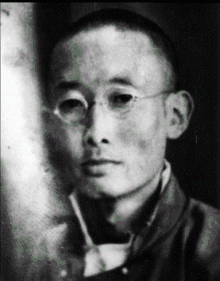Gendün Chöphel

Gendün Chöphel (Tibetan: དགེ་འདུན་ཆོས་འཕེལ, Wylie: dge 'dun chos 'phel )[1] (1903–1951) was a Tibetan artist, writer and scholar. He was born in 1903 in Rabkong, Amdo. He was a creative and controversial figure and he is considered by many to have been one of the most important Tibetan intellectuals of the twentieth century.
Gendün Chöphel was a friend of Rahul Sankrityayan. His life was the inspiration for Luc Schaedler's film The Angry Monk: Reflections on Tibet.[2] He is best known for his collection of essays called The Madman's Middle Way: Reflections on Reality of the Tibetan Monk Gendun Chophel.[3] and Grains of Gold: Tales of a Cosmopolitan Pilgrimage, written during his time in India and Sri Lanka in between 1934 and 1946. These essays were critical of modern Hinduism, Christianity, and British imperialism. While condemning places and events like the Black Hole of Calcutta and the Goa Inquisition, he praised certain British colonial practices like the abolition of sati.[4]
See also
References
- ↑ 西藏革命党考实
- ↑ The Angry Monk: Reflections on Tibet
- ↑ Lopez Jr., Donald S. (2006). The Madman's Middle Way: Reflections on Reality of the Tibetan Monk Gendun Choephel. Chicago: The University of Chicago Press. ISBN 0-226-49316-4.
- ↑ Schaeffer, Kurtis R; Kapstein, Matthew T; Tuttle, Gray, eds. (2013). "Tibetans Addressing Modern Political Issues". Sources of Tibetan Tradition. Columbia University Press. p. 753.
Sources
- Chöphel, Gendün (2006), Clarifying the core of Madhyamaka: Ornament of the thought of Nagarjuna. (2nd ed.), Arcidosso, GR, Italy: Shang Shung Publications
- Chöphel, Gendun; Hopkins, Jeffrey (1993), Tibetan Arts of Love, Snow Lion Publications, ISBN 0-937938-97-1
- Chöphel, Gedün (2006). Die tibetische Liebeskunst. Nietsch. ISBN 3-934647-97-9.
- Chöphel, Gedun (1985). Dhammapada, Translation of the Dharma Verses with the Tibetan Text. Dharma Publishing. ISBN 0-913546-98-4.
- Chöphel, Gedun (2009). In the Forest of Faded Wisdom: 104 Poems by Gendun Choephel, a Bilingual Edition, edited and translated by Donald S. Lopez Jr. University of Chicago Press. ISBN 978-0-226-10452-2.
- Bogin, Benjamin; Decleer, Hubert (1997), "Who was 'this evil friend' ('the dog', the 'fool', 'the tyrant') in Gedun Choephel's Sad Song?", The Tibet Journal, 22 (3): 67–78
- Dhondup, K.: "Gedun Choephel: the Man Behind the Legend". Tibetan Review, vol. 13, no. 10, October 1978, p. 10–18.
- Huber, Toni (2000). Guide to India, a Tibetan Account By: Gendun Choephel. Dharamsala, India: Library of Tibetan Works & Archives. pp. 162pp. ISBN 81-86470-25-5.
- Jinpa, Thupten (2003), "Science as an Allay or a Rival Philosophy? Tibetan Buddhist Thinkers' Engagement with Modern Science", in Wallace, B. Alan, Buddhism & Science: Breaking New Ground, Published by Columbia University Press, pp. 71–85, ISBN 0-231-12335-3
- Lopez, Donald S. (Jr.) (2007). The Madman's Middle Way: Reflections on Reality of the Tibetan Monk Gendun Choephel. University Of Chicago Press. ISBN 0-226-49317-2.
- Mengele, Irmgard (1999). Gedun Choephel: A Biography of the 20th Century Tibetan Scholar. Dharamsala, India: Library of Tibetan Works & Archives. ISBN 81-86470-23-9.
- Stoddard, Heather (1985). Le mendiant de l'Amdo (Recherches sur la Haute Asie). Paris: Societe d'ethnographie. ISBN 2-901161-28-6.
- Roerich, George N. and Gedun Choephel (Translator) (1988). The Blue Annals by Gö Lotsawa. Motilal Banarsidass, Delhi, 1976, Reprint in 1979. [reprint of Calcutta, Royal Asiatic Society of Bengal, 1949, in two volumes].
External links
- Gendun Choephel
- The Story of a Monk Wanderer: part 1 , part 2
- Gendun Choephel – Angry Monk website